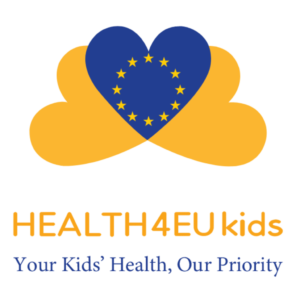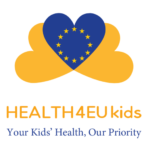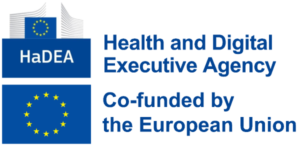General Assembly “Health4EUkids” – Budapest

At the General Assembly of the European project “Health4EUkids” that took place on 25th and 26th June 2024 in Budapest (Hungary), the Head of Department of Health Promotion of the Hungarian organization Nemzeti Nepegeszsegugyi Kozpont, Dr. Rita Simich, as well as the scientifically responsible of the project, Dr. Apostolos Vantarakis, professor of hygiene from the University of Patras (Greece) welcomed the collaborated partners (Belgium, Croatia, Finland, Greece, Hungary, Italy, Lithuania, Malta, Poland, Portugal, Slovenia, Spain) of the joint action of the EU4Health European project co-funded by European Union and HaDEA.
The Health4EUkids project is included in the field of health promotion and prevention of non-communicable diseases, indicating best practices and specific risk factors from research results on childhood obesity that have already been developed from previous research actions, namely Grünau Moves (Germany) and Smart Family (Finland).
Vasiliki Iliopoulou (6th Health ADM, Greece) presented the Amendment issues by referring to the types of the amendment asked by the Consortium and the Reporting issues by referring to the details of the technical and financial reports that each country will deal in the upcoming months.
Apostolos Vantarakis (UPAT, Greece) presented the project’s progress of the Management Plan by referring to the progress of the WPs made until now, the responsibilities of the GAB, PAB, SAB bodies and the scheduled and upcoming meetings as well as the Communication and Dissemination Plan by referring to effort made by the coordination team and the partners regarding KPIs, website, social media, communication and dissemination material.
Zsofia Kimmel (NNGYK, Hungary) presented the Monitoring and Evaluation framework of the project by referring to the key indicators of the Evaluation plan and the results of the meetings questionnaire and satisfaction questionnaire for the participating countries, as well as the interim evaluation report and the next steps.
Vittorio Palermo (ISS, Italy) presented the Transferability and Sustainability overview of the tasks by referring to the results of the research made for other European initiatives addressing children’s health promotion and responsive parenthood, the State of the art of policies and programmes on children’s health promotion and responsive parenthood in EU, the Stakeholders’ Consultation, the Scalability and transferability and the upcoming meeting in EUPHA Conference 2024.
Rosana Peiro Perez and Marta Garcia (FISABIO, Spain) presented the Grunau moves best practice by referring to the results until now, the training pills organized in collaboration with the best practice owners, the implementation plan guide with the process indicators monitoring, the evaluation framework, outcomes and impact of the actions and the upcoming publications.
Heli Kuusipalo and Nella Savolainen (THL, Finland), Taina Sainio and Kati Kuisma (FHA, Finland) presented the Smart Family best practice by referring to the lessons learned, the implementation challenges, the phases of the Smart Family assessment framework, as well as the progress of the tasks made until now such as the preparatory phase, the implementation plan, the upcoming tasks and the consultation strategy and a questionnaire regarding the Smart Family assessment framework.
Finally, all the participants expressed their satisfaction about the progress of the project and made an overview on the next steps.
#HaDEA
 The “HEALTH4EUkids” Joint Action aims to implement health promotion and prevention strategies for child obesity across European countries. It seeks to share best practices and research findings, particularly focusing on the initiatives Grunau Moves from Germany and Smart Family from Finland. The project involves knowledge transfer, cooperation between member states, policy development, and the promotion of healthy lifestyles in families and communities. Its goal is to prevent childhood obesity, increase physical activity and healthy diet, and ensure the sustainability and transferability of successful practices to other member states.
The “HEALTH4EUkids” Joint Action aims to implement health promotion and prevention strategies for child obesity across European countries. It seeks to share best practices and research findings, particularly focusing on the initiatives Grunau Moves from Germany and Smart Family from Finland. The project involves knowledge transfer, cooperation between member states, policy development, and the promotion of healthy lifestyles in families and communities. Its goal is to prevent childhood obesity, increase physical activity and healthy diet, and ensure the sustainability and transferability of successful practices to other member states.
This project has received funding from the European Union’s EU4HEALTH Programme under the Grant Agreement no 101082462






